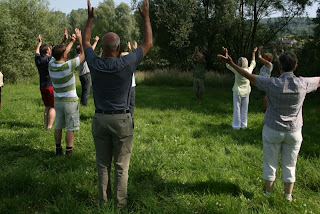Faith, Hope and Qi
It was a close brush with death and she couldn’t bear the
thought of leaving her husband and nine year old daughter. Mae Castro, 44, a
retired banker, was diagnosed with stage 4 ovarian cancer with liver metastases
(which means the cancerous tumors from her ovaries spread to her liver) in
2006. She went into surgery a month later to remove her ovaries, and began six
cycles of chemotherapy. Castro was lucky: She received love and support ranging
from financial help to thoughtful gifts like flowers. But she felt something
was missing. “I felt a void inside that wanted to connect with other s like me,”
Castro says. “The struggle of balancing a healthy lifestyle and a worry free
working environment was taking its toll on my still-recovering body”.
Finding Strength
A year after getting diagnosed, she read about the Carewell
Community in a newspaper article. The facility teaches Shen Zheng Qigong, which
means an “Awakening of the Senses.” Qigong (pronounced as cheegong) consists of
slow movements using arms and feet, while one concentrates on breathing. Practicioners
describe it as a “breathing in of the good, exhaling the bad”. The Chinese
believe that each person has qi circling in the body ward off diseases. A spot
on our lower abdomen is called the “Dan Tian,” a reservoir for the qi circling
our body. This is the center of gravity while practicing qigong.
In a study published in Alternative Therapies in Health and
Medicine, researchers found that cancer patients who enrolled in a 20-week
contemplative self healing meditation program reported significant improvement
in their mental health, lower cortisol levels (the hormone that produces
stress).
Castro started attending sessions regularly in 2008. She believes
it helps her deal with physical pain. “I practice qigong when I an anxious-
usually before and during medical examinations or a procedure.”
Qigong has simple movements that help develop balance, flexibility
and strength. Anyone can do the class; physical limitations are not a barrier. “We
have someone attending on her wheelchair, and she does only the hand movements,”
Castro says. “The rest of the class does the practice standing and sitting alternatively.”
The main benefit of these classes is the feeling of calm
after every session, which is important for women under a lot stress from
battling their cancer. Castro tries to do it on her own every day. “I want to
integrate it into my life,” Castro says.
Leading the way
A cancer survivor, Roger Simone, 52, teaches the qigong
classes at Carewell. His students vary in number each week; many go for
treatments and are unable to attend the sessions regularly.
Simone was working as a hyperbaric medicine specialist in
Hawaii when he learned that he had cancer. “My friend and I were diagnosed with
melanoma at the same time,” he shares. “He followed the Western medical
approach of surgery, chemotherapy, and gene therapy. He died after three years.
I decided to only have surgery to remove the cancer. I changed every aspect of
my life following the principles of qigong, medicinal herbs, and acupuncture. Ten
years later, I’m cancer free.
Simone moved to Manila about three years ago when Master Li
Jun Feng and Anabel Alejandrino of the Sheng Zhen Qigong Manila invited him to
join the group as an instructor. He’s lived in Manila ever since and feels
blessed to be able to share his knowledge with fellow survivors. “My students
say that they sleep better right away,” Simone says. “Many report an improved
sense of well being and ability to handle stressful situations with less worry.”
“I practice Qigong when I’m anxious.. Qigong taught me and
my family to be more expressive and open to sharing how we feel at the moment.”
One qigong practice is called “Laughing Qigong”. Ever had a
long, laughing fit? You feel exhilarated and relaxed afterwards. The basic
concept of this qigong is similar; where you move your arms slowly and consciously
laugh out loud. “The laughing qigong opened me to a more fun way of living my
life with my family,” says Castro. “Qigong taught me and my family to be more
expressive and open to sharing how we feel at the moment.”



No comments:
Post a Comment